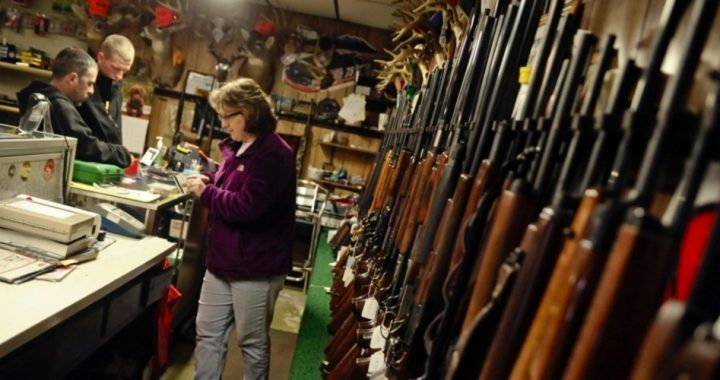
It’s an example, in essence, of legislating from the bureaucratic cubicle. A House committee has discovered e-mails showing that officials at the Federal Deposit Insurance Corporation schemed to destroy lawful businesses they found morally objectionable.
The vehicle through which this is done is Operation Choke Point; this is an Obama administration effort ostensibly designed to “choke off” access to the U.S. financial system to illegal operations, but it’s also being applied to legal ones that certain ideologues personally dislike. Its primary target is the short-term lending industry, but its other victims include entities such as firearms and ammunition merchants, home-based charities, coin dealers, and purveyors of pharmaceutical drugs — lawful enterprises all.
The e-mails were revealed by the House Oversight and Government Reform Committee (HOGRC), which released a 20-page investigative report on Monday explaining how the FDIC worked hand-in-glove with the Department of Justice to implement Operation Choke Point. The Daily Signal’s Kelsey Harkness provides some details:
Emails unearthed by investigators show regulatory officials scheming to influence banks’ decisions on who to do business with by labeling certain industries “reputational risks,” ensuring banks “get the message” about the businesses the regulators don’t like, and pressuring banks to cut credit or close those accounts, effectively driving enterprises out of business.
The House panel’s investigation, led by Rep. Darrell Issa, R-Calif., and Rep. Jim Jordan, R-Ohio, cites confidential briefing documents that show senior Justice Department officials informing Attorney General Eric Holder that, as a consequence of Operation Choke Point, banks are “exiting” lines of business deemed “high risk’” by regulators.
“It’s appalling that our government is working around the law to vindictively attack businesses they find objectionable,” Issa, chairman of the Oversight Committee, said in a press release.
Reflective of this is an e-mail Thomas Dujenski, FDIC’s Atlanta regional director, sent to Mark Pearce, director of the Division of Depositor and Consumer Protection. Dujenski wrote, “I have never said this to you (but I am sincerely passionate about this) … but I literally cannot stand pay day lending…. I had extensive involvement with this group of lenders and was instrumental in drafting guidance on stopping abuses.”
Dujenski also injected his own moral judgment into the matter, calling pay-day lenders “fundamentally wrong.”
Addressing this mentality, Congressman Issa wrote in a press release:
Internal FDIC documents confirm that Operation Choke Point is an extraordinary abuse of government power. In the most egregious cases, federal bureaucrats injected personal moral judgments into the regulatory process. Such practices are totally inconsistent with basic principles of good government, transparency and the rule of law.
No doubt. If a given business is so immoral and destructive that prohibiting it via government action is warranted, it is a judgment for the people to make through their elected representatives — and on the state level, where such action is constitutional. This has been done before; child pornography and dangerous recreational drugs are two examples. But it’s not the place of bureaucrats to do an end run around the people and, in essence, legislate by way of bureaucratic fiat. This subordinates the will of 320 million to that of a small cabal of unelected puppeteers.
Targeting the Second Amendment
Of particular concern to many is the use of Operation Choke Point to destroy firearms dealers. Gun control has become increasingly unpopular in recent decades, making anti-Second Amendment legislation politically untenable. Its proponents have consequently turned to tactics beyond the ballot box, such as using the judicial system and suing firearms manufacturers and, now, using the bureaucratic system to regulate the industry’s retailers into oblivion. As the Blaze wrote of the HOGRC’s findings:
In the case of gun dealers, Issa’s committee found that the FDIC in some cases reached “memorandums of understanding” with banks that explicitly prohibited them from dealing with these companies.
“MOUs between supervised banks and FDIC Regional Offices, as well as bank policies submitted pursuant to FDIC Consent Orders, variously ‘prohibit’ payment processing for firearms merchants, characterize loans to firearms dealers as ‘undesirable,’ and generally subject firearms and ammunitions merchants to significantly higher due diligence standards,” it said.
And this scheming has already squeezed businesses. The Daily Signal’s Harkness presented a prime example back in August:
With no explanation, Brian Brookman last month lost the bank account for his pawn shop.
He had no idea why. Brookman says his store in Grand Haven, Mich., never had been in trouble with federal or state officials. And being in the pawn industry, he was required by law to get a city license every year.
“If there was ever a problem, they wouldn’t renew my license,” Brookman, a former police officer and Army veteran, told The Daily Signal.
After researching his case on the Internet, Brookman says he concluded that his banker, JP Morgan Chase, closed the account because two of his business activities — dealing in vintage coins and selling firearms — were labeled “high risk” by federal bureaucrats as part of an Obama administration initiative called Operation Choke Point.
Harkness also provided three other examples of choked businesses (quotations are hers):
• Secure Account Services, LLC, Lake Havasu City, Ariz. — “has been on the verge of collapse twice in the past year” because of Operation Choke Point.
• Cash Express, Las Vegas, Nev. — owner and cancer survivor Sandra Perry “couldn’t find a local bank to serve her business” and “future regulation leaves the viability of her business in limbo.”
• Powderhorn Outfitters, Hyannis, Mass. — proprietor Mark Cohen “says his bank manager of more than 20 years told him: ‘I’m very sorry to say this — I’m very embarrassed — but the bank won’t lend you money because you sell guns.’”
Perhaps now it’s clear why one congressman called Operation Choke Point “more dangerous” than the IRS scandal. That official is Representative Blaine Luetkemeyer (R-Mo.), who earlier this year filed a bill that seeks, as he wrote in a press release, “to put an end to government attempts to shut down entire portions of the private sector based on what it deems to be morally unacceptable.” “I believe this activity is probably more dangerous and more disastrous than that of the IRS scandal because this is running people out of business for no reason and it’s harming livelihoods, incomes [and] families,” he told the Daily Signal in a November interview.
Yet even this may understate the danger. If the precedent that bureaucrats may apply their own values and whims in determining who should be allowed to engage in commerce is accepted, would it really end with firearms and coin dealers or short-term lenders? What’s to stop future morality police from targeting those selling books and other items relating to Christianity or other politically incorrect products? What’s to prevent imperious bureaucrats from targeting any group finding itself on the wrong side of political fashions?
Some may say this is far-fetched, that our Constitution forbids it. But note that DOJ and FDIC bureaucrats are already acting extra-constitutionally. And once this practice is accepted, the only thing limiting how far they’ll go are personal biases and the political winds.
Photo: AP Images



